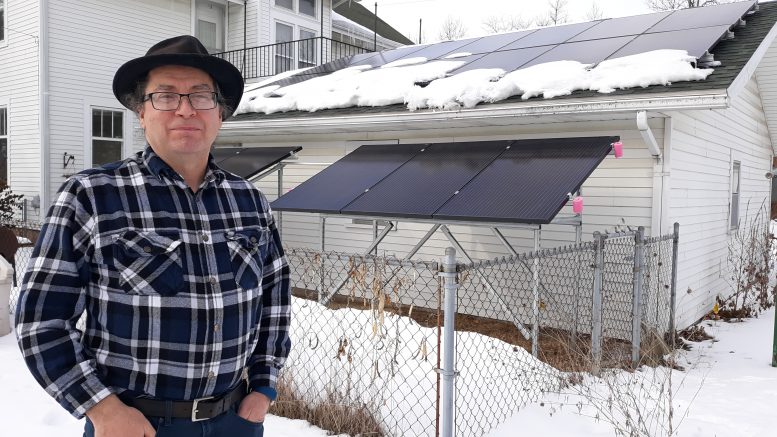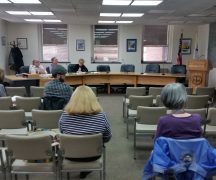By JAN LARSON McLAUGHLIN
BG Independent News
After years of planning, Joe DeMare had rooftop solar panels installed on his home last July. A big believer in green energy, DeMare wasn’t banking on the solar power being a big money-maker – but he also hadn’t figured on it costing him money beyond the installation.
So when he got a letter from BG Municipal Utilities late last year about an $188 refund, he was pleased.
But another letter from the utilities department explained that the city had instituted a new fee for solar energy, DeMare said. That fee should be called a “fine,” he said during a recent City Council meeting.
That “fine” increases with each kilowatt produced, DeMare said.
“This really discourages anyone from putting solar panels on their homes in Bowling Green,” he said. “This is not what a progressive community does.”
DeMare said the letter from the utilities department attributed the fee to “unavoidable expenses” incurred when rooftop solar systems transfer the extra power onto the grid to be used by other electric customers.
“There’s no justification for these increasing penalties,” he said.
DeMare asked City Council to reverse the decision on the rooftop solar fee. Council President Mark Hollenbaugh asked that more information on the new fee be presented to council.
“Many of us have roofs that face south and are willing to help the city with solar” – but not if there is a fee charged, DeMare said.
But Brian O’Connell, director of the city’s public utilities, said the fee is necessary to make sure other electric customers in the city aren’t paying for those who choose to install rooftop solar panels.
The electric rates in the city are based on customers buying their energy from the city. A smaller portion of the rates is based on fixed costs for electric system for such items as meters, poles, wire, transformers, switches and linemen – items needed for all homes including those with rooftop solar, O’Connell said.
“Those fixed costs don’t change just because someone decides to put rooftop solar on their home,” he said.
The city reimburses rooftop solar systems for the extra energy they produce and send to the city’s grid to be shared with other users.
Without that fee being charged to homes with their own solar power, “the other customers are subsidizing their energy sales,” he said.
“Our goal was to set up a policy that is fair for customers who want to use it, but won’t penalize other customers,” he said.
But DeMare questioned that rationale.
“That’s misleading. It doesn’t cause any more wear and tear” to the city’s system to send extra power onto the grid, DeMare said.
The new fees will go into effect in July, and will start out charging $1 a month per kilowatt capacity. That will be $6 per month for a system like DeMare’s which produces six kilowatts.
The fee will increase $1 annually, until it reaches the ceiling of $4 per kilowatt capacity – or $24 a month for DeMare.
O’Connell stressed that Bowling Green is committed to solar energy – evidenced by the largest municipal-owned solar field in the state, located east of the city.
“We are not against renewable energy,” he said. “But there’s also a financial obligation to make sure the system is kept whole.”
The city is pleased to credit rooftop solar homeowners for the extra energy they produce, he said.
“We are going to assume the rooftops are producing energy during peak times in the city,” O’Connell said. “We realize there’s a value for that.”
DeMare said the new policy will discourage homeowners from installing rooftop solar systems – as will the decision to cut reimbursements to half the wholesale rate.
But O’Connell said he expects to see more homes in the city installing their own solar panels.
“There’s definitely an interest,” O’Connell said. “The interest in rooftop solar has increased greatly in the last two years alone.”





